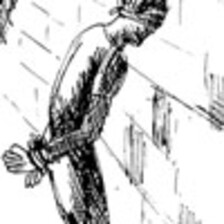Al-Ayyam 9 July 2003

Bashar did not know much about the prison he was in except after he was transferred to other prisons such as ‘Majido’ and ‘Ofer’, where he was detained for 3 months. Other detainees later explained to him that he was in one of the secret prisons located in distant areas, used to for interrogation with detainees with serious accusations.
Bashar, a known tradesman in Nablus had just returned from Turkey that day, 22nd of November last year, after a business visit to import a shipment of clothes to his known shop in the city, when he was arrested with his cousin Mohammad (23 years old), who was accompanying him. They were taken from the bridge directly to prison.
It seemed ambiguous from the moment they were arrested. They were handcuffed and blindfolded and placed in a truck, as well as forced to keep their heads down throughout the journey, estimated between 5 to 10 hours.
“I don’t remember, the truck was moving and moving, the blindfold tight on my eyes to an extent that I could not even see daylight,” said Bashar.
“I remember the sound of the prison gate opening from the inside by an electric button and that we were on the ground floor and not underground as one would imagine,” he said.
Bashar was placed in a cell with black or gray walls that contained a cement bunk bed, an hole for a toilet and a water hose pipe controlled by a guard from the outside.
This cell was in one of two long lines of cells facing each other and guarded closely. Detainees can see nothing but their cells.
“They made us wear dark glasses that cover the whole area of the eyes, before getting us out of the cell, to take us to a specific room, whether the interrogation room or the clinic, and they do not lift the glasses except after we enter the specific room.”
Bashar was getting to know the place through his senses.
He said, “It seemed to me that the interrogation section is separated from the cells, as I used to hear the sound of the door opening with an electric button each time I was moved from the cell to the interrogation room.”
Throughout his arrest, Bashar used to hear continuous movement of planes in the place.
“I used to hear sounds of different planes, including the observation planes that work without pilots and make a loud noise.”
He added, “This plane used to take off and land several times a day, which gave me the impression that I was detained in a prison inside a military base.”
After a while Joudalalh tried to find out what the name of the place was, but the interrogator did not answer him.
“Despite all the constraints surrounding me, it occurred to me to ask about the location, so the interrogator replied by saying, ‘You are on the moon’, so I remained silent after that.”
One day, the interrogator told Bashar’s cousin that Fateh leader Marwan al-Barghouti was interrogated in the same prison.
Bashar said, “The interrogator said that Marwan’s legs were dangling down the chair during interrogation because he is too short.”
The detainee feels complete isolation in the prison and does not know anything about what surrounds him.
Bashar said, “It seemed to me that I was going to be in that prison for ever, boredom was eating me up to an extent that I wished I would die to end the never-ending daily torture.”
What saved Bashar from the continuation of interrogation without mercy was that his cousin, the owner of a computer company in Nablus, admitted that he was a Hamas activist.
Bashar said, “I am a normal resident. I work in trade and never thought for one day that I would be arrested but it seems they arrested because of my cousin.”
The prison guards confiscated 3,500 Jordanian Dinars from Bashar, which have not been returned to date.
It was revealed lately that such a prison exists when a lawyer asked a judge in ‘Beit Il’ court about the whereabouts of his client and the judge replied by saying, “There is a secret place that I cannot give you any details about.”
Head of the Palestinian Detainee Center Issa Qaraqi’ said that news concerning this prison was also revealed lately in an American report.
This prison is no different from the 22 other Israeli prisons, in which 6500 Palestinian detainees are held, many in complete isolation.
Bashar said, “The interrogators made me feel that I was going to be placed there until the end of my life, and I reached a point of wishing I had something to say so I can end this agony, and once I even asked them to write down whatever they wanted so I can sign and get it over and done with, but they refused.”
The article was originally published in Palestinian daily newspaper Al-Ayyam. Translated by Hear Palestine.


